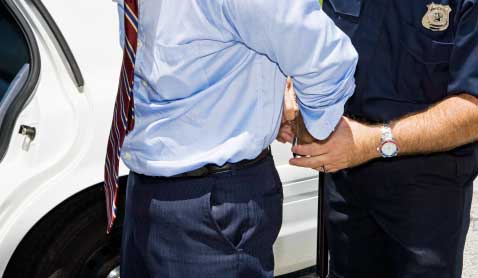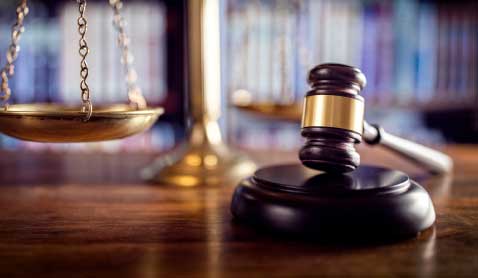Virginia Beach Criminal Defense Lawyers
Facing criminal charges is a serious matter. If convicted, someone could be looking at hefty fines, court-ordered community service, or even time in prison. Everyone charged has a right to legal representation to help them through the process and arrive at the most favorable result. There are numerous reasons why someone might be charged with a crime, such as mistaken identity, false information, and poor judgement. Confronting the criminal justice system alone can be daunting.
The system seizes on those individuals that choose to take on the criminal justice system alone. The prosecutor might try to take advantage of the lack of knowledge and attempt to arrive at an outcome that is more favorable to them. A knowledgeable and dedicated criminal defense lawyer will ensure that their client receives the best possible outcome.
What are My Rights When I Get Arrested?

The U.S. Constitution establishes that those who are charged with a crime are innocent until proven guilty. In addition, laws have been passed that ensure the rights of the accused. The Fifth Amendment of the Constitution protects individuals from self-incrimination, meaning that they cannot confess to a crime unless willing to do so.
A suspect should be read their Miranda rights just prior to questioning, regardless of their arrest status. It is important to know one’s rights, which include:
- The right to remain silent. This is the heart of the Fifth Amendment. An individual does not have to say anything that will incriminate them. It is best not to answer any questions until contacting a criminal defense lawyer. If an individual decides to give a confession, they must affirmatively waive their rights. However, there are instances when a confession has made it to court prior to the suspect being read their Miranda rights.
- The right to consult a lawyer. Everyone arrested in the United States has a legal right to counsel. They do not have to answer any substantive questions until speaking with a criminal defense lawyer. If an individual cannot afford one, the state will appoint one free of charge. An arrested suspect still has to answer some basic questions without a lawyer present, such as their name, age, and address.
- The right to decline a search. The police or investigators must obtain permission before conducting a search of one’s home or vehicle. They have the right to search an individual for their own safety, but they cannot search one’s personal space without a warrant. Individuals have the right to decline a search and should not allow police to intimidate them into granting permission.
Being convicted of a crime can have significant consequences to one’s life and family. Knowing one’s rights ahead of time will protect them from making early decisions they cannot take back. It is important to note that an individual can always revoke permission at any point in the process.
What are the Penalties of a DUI Charge in Virginia?
In Virginia, if a driver has a blood alcohol content (BAC) level of 0.05 , they can be charged with driving under the influence (DUI) if the totality of the circumstances show the driver was impaired while driving, which is a Class 1 misdemeanor. If a driver has a BAC of .08 or higher, then it is presumed that the driver was impaired while driving, without the necessity of the totality of the circumstances. That can make it a significant crime in the Commonwealth. It can carry heavy fines, as well as potential jail time, depending on the BAC level. If charged with a first offense, an individual will have their license suspended for seven days upon arrest. If convicted, an individual will face a one-year suspension of their license. It also carries with it a fine of up to $2,500. If a juvenile is in the car at the time of arrest, it will add an extra fines and will include a mandatory jail sentence.
Regardless of the BAC level or any circumstances associated with the arrest, if convicted, individuals might have to enroll in the Virginia Alcohol Safety Action Program (VASAP). Participation in the VASAP is under the judge’s discretion, and one might be able to pre-quality for the program before trial. It normally runs for several weeks, with two-hour classes per week. The program is not free and costs money. A court may require someone to participate in the program to avoid going to jail. Also, attending the program will make them eligible to apply for a restricted driver’s license. This will enable an individual to drive to essential places, such as work, school, religious services, and medical treatments. An ignition interlock device will also need to be installed on the vehicle to qualify. If a person has a BAC between 0.15 but less than 0.20, they will receive at least a five-day jail sentence. There is no minimum jail time for any levels below 0.15. For the second offense within a period of time after the prior DUI, an individual will face an immediate license suspension of 60 days. Then, if convicted, they will face a three-year suspension. Fines are also increased.
What are My Options if I am Charged With Assault?
Virginia law has merged assault and battery into assault. To convict an individual of that charge, the prosecutor must prove beyond a reasonable doubt that the individual not only intended to hurt a person, but they followed through with their actions. If a prosecutor cannot prove intent, then they will try to prove recklessness. However, a lawyer will try to prove that the incident was an accident. An accident without recklessness cannot be considered a crime. A defense in these cases is to prove the incident was an act of self-defense. This is a common defense when there is an altercation between two people.
Assault is a Class 1 misdemeanor, which carries a fine of $2,500 and a one-year jail sentence. However, there are numerous factors that can impact that sentence, including the level of violence of the act, the victim, and the criminal record of the accused. Other variables can trigger felony charges, which are punishable with time in a state correctional facility, and longer prison sentences. For instance, an assault on certain groups of individuals will require a mandatory two-day jail sentence in addition to other jail time imposed. Those individuals include:
- Guidance counselors
- Principals
- Full or part-time teachers
- Assistant principals
- Emergency medical workers
Other victims that can escalate the charge to a Class 6 felony are judges, correctional officers, police officers, firefighters, and emergency services volunteers if the assailant knew the profession they were in and attacked them for that reason. They also cannot assault someone because of their religion, color, national origin, or race, otherwise they can be charged with a Class 6 felony.
How Do Domestic Violence Charges Differ From Assault?

The two charges are similar, although authorities will distinguish a difference by classifying an assault among family members as a Class 1 misdemeanor. The main difference comes when addressing repeat offenders. Unlike assault where in the second and third conviction that occurs within 20 years have the same punishments, the same cannot be said of the second and third domestic violence conviction that takes place less than 20 years apart. Police officers called to the scene of domestic violence, battery, or misdemeanor assault have the authority to make an arrest on the spot if they have probable cause. They have the same arrest authority if there are violations in a protective order or a stalking case.
The Commonwealth treats domestic violence like a pattern of various types of abuse and will sentence the guilty party based on their prior criminal history. For instance, a first-time offender could receive up to a year in jail and/or a fine of $2,500. Meanwhile, a third-time offender can be found guilty of a Class 6 felony, which includes a prison term of up to five years and/or a $2,500 fine. If the third offense happened within 20 years of the last two convictions, it will be a felony charge. Another ramification to consider about a domestic violence conviction is that it will initiate a federal ban to carry a firearm. This could prohibit a person from obtaining a job, which requires the applicant carry a firearm.
What are the Penalties for Being Convicted of a Crime in Virginia?
Like with many states, Virginia classifies its criminal charges into two categories: felonies and misdemeanors, with the former being the more serious of the two. They each carry with them a certain level of severity by class, with the first class topping the list. The sentences are commensurate upon the seriousness of the charge. Punishments for felonies are as follows:
- Class 1 Felony: Life imprisonment and a fine up to $100,000.
- Class 2 Felony: Life imprisonment or imprisonment for at least 20 years, and a fine up to $100,000.
- Class 3 Felony: Imprisonment for at least five years and not more than 20 years, and a fine up to $100,000.
- Class 4 Felony: Imprisonment for at least two years and not more than 10 years, and a fine up to $100,000.
- Class 5 Felony: Imprisonment for at least one year and not more than 10 years, and a fine up to $2,500. There is discretion here from a judge and jury to reduce the sentence to less than a year.
- Class 6 Felonies: Imprisonment of at least one year and not more than five years, and a fine up to $2,500. The judge and jury have the discretion to limit the sentence to less than one year.
Meanwhile, there are four classes of misdemeanors that carry their own level of punishment. Like felonies, the more severe ones carry harsher sentences. They are:
- Class 1 Misdemeanor: Imprisonment up to one year, and a fine up to $2,500.
- Class 2 Misdemeanor: Imprisonment up to six months, and a fine up to $1,000.
- Class 3 Misdemeanor: A fine up to $500.
- Class 4 Misdemeanor: A fine up to $250.



